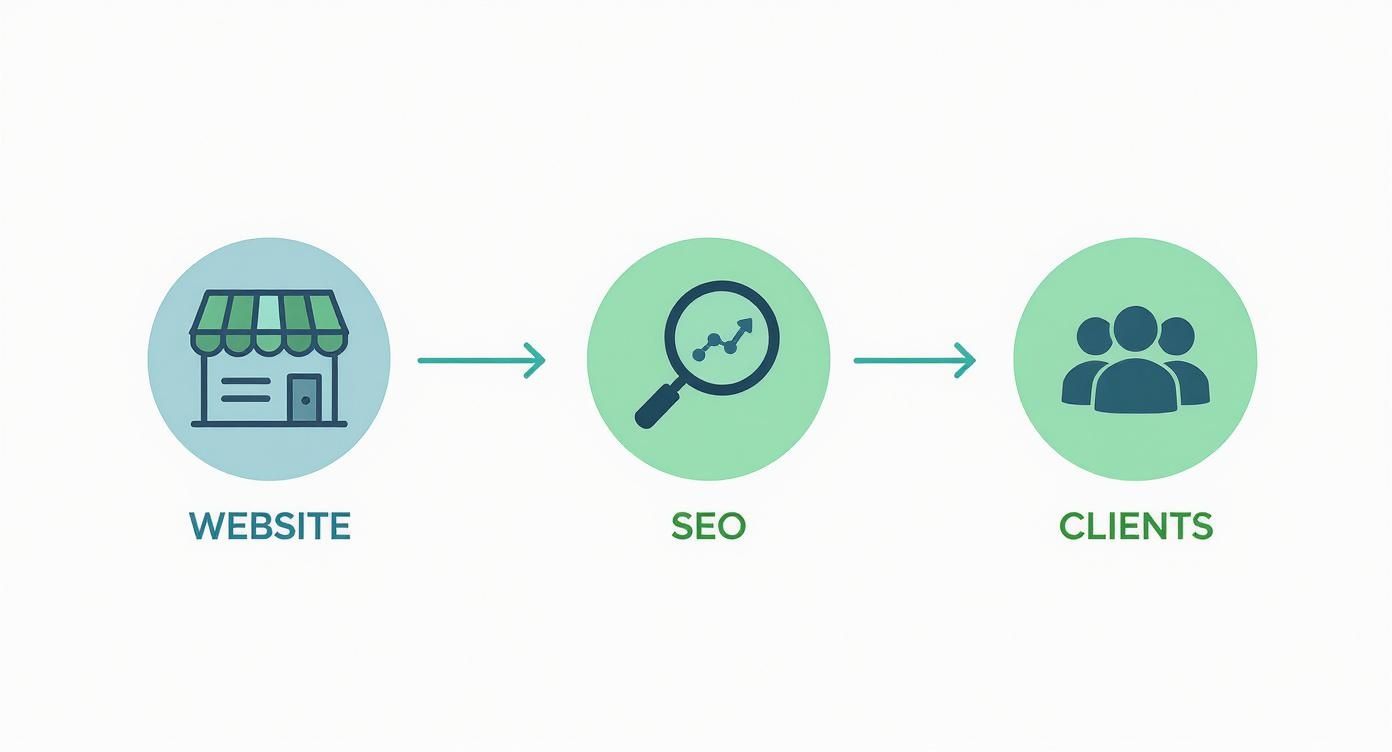SEO company for business growth
An SEO company is essentially your partner that helps a business attract customers from search engines like Google. Its job is to get your site into the top results when people look for your products or services. This ensures a steady flow of already interested visitors.
What an SEO company actually does for a business
Imagine your website as a new store in a huge city. Without a bright sign, directions, and good reviews, no one will find it among thousands of competitors. An SEO company is the architect of your online visibility, laying convenient and noticeable paths to your business.
The main goal is not to drive random visitors to the site. The key task is to bring the very audience that is already actively searching for what you offer. This fundamentally distinguishes SEO from many other forms of advertising where you try to “break through” to a cold audience.
An investment in the future, not instant results
Businesses often weigh SEO against paid search (PPC), but at their core these are completely different tools. Paid ads deliver a quick yet temporary effect: customers come while you pay. As soon as the budget runs out, the flow of visitors stops.
SEO, by contrast, works like a long-term investment. Results don’t appear immediately, but they compound. A well-optimized site keeps bringing free organic traffic for years, gradually becoming a valuable asset for your business.
A professional SEO agency ensures your site not only meets search engines’ technical requirements but is also as convenient and useful for people as possible. This simultaneously boosts trust from both Google and your potential customers.
To better understand each channel’s role in your marketing strategy, let’s look at key differences. This helps you make more informed decisions.
SEO vs. PPC (paid search) comparison
| Parameter | SEO (Organic search) | PPC (Paid ads) |
|---|---|---|
| Speed of results | Slow (3–6 months) | Fast (within hours) |
| Cost | Pay for specialists’ work | Pay per click or impression |
| Duration of effect | Long-term, persists after pausing work | Temporary, disappears immediately after stopping |
| Trust level | High (users trust organic more) | Medium (the “Ad” label can deter) |
| Coverage | Broad queries, including informational | Narrow, focused on commercial queries |
| Stability | More stable in the long run | Depends on budget and competitor bids |
As you can see, both tools have strengths. They work best in synergy: PPC delivers quick initial results while SEO builds a strong foundation for future growth.
The SEO services market in Ukraine
Competition for online attention keeps growing, which naturally stimulates the digital services market. Today in Ukraine, over 150 SEO companies offer a full range of services—from technical optimization to content marketing and link building. This figure has surged in recent years thanks to the growth of the IT sector.
Moreover, according to surveys, over 70% of Ukrainian IT companies consider SEO a key client acquisition channel, underscoring its importance. If you want to dive deeper into the numbers, check out TechBehemoths’ research.
Ultimately, working with an SEO company isn’t about tricks or manipulating algorithms. It’s about building a solid foundation for your business in the digital space. A comprehensive SEO approach not only boosts sales but also strengthens your brand’s reputation, turning your website into a reliable source of new customers.
What a modern SEO agency actually does
Today, an SEO company isn’t just a contractor buying links somewhere. It’s a multidisciplinary team building a holistic ecosystem for your site, turning it into a steady stream of customers. Each workstream plays its part, and the real magic happens when they work together.
Imagine your site as a race car. To finish first, fueling up isn’t enough. The engine must run flawlessly, the body must be aerodynamic, and the navigator should plot the shortest route. That’s how comprehensive SEO works.
This infographic nicely illustrates how competent SEO becomes a bridge between your site and the customers already looking for you.

As we can see, SEO connects your business with your target audience at the moment they’re ready to buy.
Technical SEO: a solid foundation for growth
Any website promotion starts with a deep technical audit. It’s like inspecting a house before buying: first, the foundation, walls, and utilities—then the wallpaper color. If crawlers can’t properly “read” (crawl) and add pages to their database (index), all further efforts are wasted.
What’s included?
- Load speed: Sites that take longer than 3 seconds to load lose up to 40% of potential customers. That’s a fact.
- Mobile adaptation: Today, over 60% of searches happen on smartphones. If your site renders poorly on phones, you lose most of your audience.
- Logical structure: A clear page hierarchy and sensible URLs help both people and search engines navigate easily.
- Fixing errors: Broken links, duplicate pages, misconfigured
robots.txtandsitemap.xml—all invisible ballast dragging the site down.
Without a reliable technical base, even brilliant content and expensive links won’t deliver results.
On‑page SEO: making pages clear and useful
With the foundation ready, it’s time to refine what users and search engines see on your pages. On‑page SEO is the art of making content both relevant to the query and compelling.
It’s not about mechanically stuffing keywords. The goal is to create content that fully answers the user’s question and properly “explains” to the search engine what the page is about.
Key elements of this stage:
- Semantic core: A complete map of search queries by which potential clients can find you. We collect everything—from obvious to unexpected phrases.
- Content optimization: Writing helpful, expert content that naturally includes keywords, synonyms, and related terms (LSI).
- Meta tags: Crafting catchy Titles and Descriptions for every page. Users see them in Google’s SERP before clicking.
- Internal linking: Connecting pages with links to distribute “weight” and improve navigation.
Competent on‑page optimization is a clear signal to Google: “This page is the best answer to the user’s query.”
Off‑page SEO and link building: building authority
If on‑page optimization is what you say about yourself, off‑page is what others say about you. The main tool here is link building—strategically acquiring external links.
Every link from an authoritative thematic resource is a recommendation—a “vote of trust” in Google’s eyes. The more quality recommendations, the higher your site’s authority.
Remember: quality beats quantity. One link from a respected industry portal outweighs a hundred from obscure forums. Modern SEO agencies use only safe methods: guest posts, outreach with opinion leaders, and placements on trusted platforms.
Content marketing and analytics: attract and measure
Content is the fuel for your SEO engine. By creating expert blog articles, detailed guides, or research, you attract an audience not yet ready to buy but already interested. This not only drives traffic but also builds your expert image.
No strategy works blindly. A professional agency constantly monitors key indicators:
- Ranking dynamics for target queries.
- Organic traffic growth and user behavior.
- Behavioral signals (time on site, bounce rate).
- Quantity and quality of new backlinks.
- Conversions from search (calls, leads, purchases).
Data-driven adjustments help you stay confident you’re moving in the right direction. If you’re curious what a full services list looks like, explore it in detail.
How to assess and choose a reliable SEO partner
Choosing an SEO company isn’t just finding another contractor. It’s a strategic decision that can either propel your business to a new orbit or waste money and time. The right partner helps you outpace competitors and win search engines’ trust; the wrong one leaves you with broken expectations.
Imagine building a house. Would you hire a crew that can’t show past work, lacks a clear plan, and offers no guarantees? Of course not. It’s the same with SEO: you need pros with proven experience, a transparent strategy, and real reviews.

So let’s break down what to look for to avoid mistakes.
Key criteria for choosing an SEO agency
To avoid drowning in offers, use this simple checklist. It helps weed out questionable vendors and focus on those truly worth your attention.
- Experience in your niche. Has the agency worked with businesses like yours? Promoting a fashion e‑commerce site vs. a private clinic are two different worlds with unique approaches.
- Transparency across the board. A good partner won’t hide behind jargon. They’ll clearly explain what, how, and why they do it, and provide reports showing not just rankings but real business metrics: traffic, conversions, leads.
- Realistic promises. Claims like “top‑1 in a month” or “100% guaranteed results” are huge red flags. Pros guarantee quality work and adherence to strategy—not fixed positions, since Google’s algorithms are unpredictable.
- Team and communication. Who is your point of contact? How quickly can you reach the manager? Good communication is two‑way: the agency not only answers but proactively explores your business.
Once you have a shortlist, dig deeper.
How to analyze case studies and reviews
Case studies aren’t just pretty up‑and‑to‑the‑right graphs. They’re stories of how an seo company solved a specific business problem.
Look beyond the numbers to the team’s logic. What was the client’s problem? What tools did they use? Why did they choose this strategy over alternatives? This reveals how they think.
Reviews aren’t straightforward either. Instead of reading testimonials on the agency’s own site, look for independent sources. In Ukraine, for instance, there are specialized rankings where real business owners and marketing directors rate agencies—far more objective. Learn more about how SEO agency rankings in Ukraine are formed from independent studies.
Questions to ask in the first meeting
Your first call or meeting is your chance to conduct an interview. Don’t hesitate to ask detailed—even tough—questions.
- What strategy do you propose for my business and why? Beware of standardized “service packages” offered without digging into your specifics.
- Who exactly will work on my project? It’s important to know whether there are specialists: technical SEO, link builder, content marketer.
- How will you measure success? The right answer isn’t “top‑10 rankings,” but business KPIs: organic traffic growth, more leads, return on investment (ROI).
- What link acquisition methods do you use? Ensure the agency avoids “gray” or “black” tactics (spam, link buying) that could trigger Google filters.
- What will you need from my team? Successful SEO is always a partnership. The agency will need your product expertise, analytics access, and possibly help with content.
Choosing the right SEO company isn’t quick. It’s an investment that, if done right, pays off many times over: with a steady client flow, growing brand awareness, and strong market positions. Remember: you seek not just a vendor, but a reliable long‑term partner.
How to measure SEO effectiveness and what to expect
When a business invests in SEO, it’s natural to want immediate results. But promises to hit Google’s top‑1 in a month are, to put it mildly, misleading. In fact, it’s a red flag signaling incompetence—or even “black hat” tactics that could lead to penalties.
In a world where the rules constantly change, the only real guarantee from a professional SEO company is quality work, transparent processes, and strict adherence to the agreed strategy.
SEO is more of a marathon than a sprint. Results don’t appear instantly; they accumulate over time like compound interest. Your task is to evaluate not instant “wins,” but steady progress toward the ultimate goal—profit growth.
From rankings to business metrics
Focusing only on a few “fat head” keywords is a last‑decade approach. Users search in thousands of ways today, so true success is measured by metrics that matter for business.
The main SEO effectiveness criterion isn’t a rank position but growth in targeted actions (conversions) from organic traffic. Your site can rank first, but if that doesn’t bring calls, leads, or sales—what’s the point?
A reliable SEO partner will always focus you on key KPIs that directly impact your bottom line.
Here are the core metrics that truly matter:
- Organic traffic growth. The foundation. It shows your site is becoming more visible and attracting more potential customers without paying per click.
- Visibility for target queries. Shows how many relevant keywords your site ranks for in the top results. The broader the semantic coverage, the more touchpoints with your audience.
- Increase in conversions from organic. The most important KPI—tracking leads, purchases, calls, and other actions from search visitors.
- Improved behavioral signals. More time on site, more pages per session, and lower bounce rates signal to Google that your content is useful and engaging.
To stay on top of things, regularly analyze these indicators. They give an objective picture of whether your SEO investment is paying off.
Key KPIs for evaluating SEO effectiveness
The table below helps you understand which metrics to track and what they mean for your business.
| KPI (Performance indicator) | What it means for business | Tools for tracking |
|---|---|---|
| Organic traffic | An increase in potential customers finding you via search. | Google Analytics 4, Ahrefs |
| Number of conversions | A direct profitability indicator—how much revenue organic brought. | Google Analytics 4 (with configured goals) |
| Average position | Overall visibility for target queries; helps gauge dynamics. | Google Search Console, Serpstat |
| Bounce rate | The percentage of visitors who leave after one page. | Google Analytics 4 |
| ROI (Return on Investment) | The key financial metric: how many units of profit per unit invested. | Calculated manually or via CRM systems |
The right KPIs turn abstract “site promotion” into a clear, measurable business process.
Realistic expectations and timelines
First noticeable SEO results usually appear after 3–6 months of systematic work. In highly competitive niches, it can take 9–12 months. That’s normal: search engines need time t
